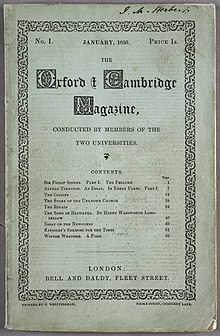
William Morris was a British textile designer, poet, artist, fantasy writer, and socialist activist associated with the British Arts and Crafts movement. He was a major contributor to the revival of traditional British textile arts and methods of production. His literary contributions helped to establish the modern fantasy genre, while he helped win acceptance of socialism in fin de siècle Great Britain.
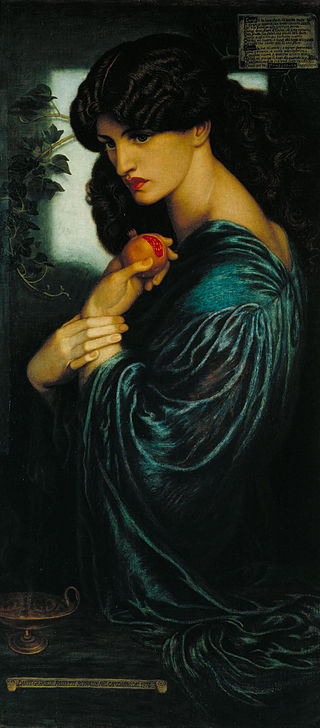
The Pre-Raphaelite Brotherhood was a group of English painters, poets, and art critics, founded in 1848 by William Holman Hunt, John Everett Millais, Dante Gabriel Rossetti, William Michael Rossetti, James Collinson, Frederic George Stephens and Thomas Woolner who formed a seven-member "Brotherhood" modelled in part on the Nazarene movement. The Brotherhood was only ever a loose association and their principles were shared by other artists of the time, including Ford Madox Brown, Arthur Hughes and Marie Spartali Stillman. Later followers of the principles of the Brotherhood included Edward Burne-Jones, William Morris and John William Waterhouse.

Gabriel Charles Dante Rossetti, generally known as Dante Gabriel Rossetti, was an English poet, illustrator, painter, translator, and member of the Rossetti family. He founded the Pre-Raphaelite Brotherhood in 1848 with William Holman Hunt and John Everett Millais. Rossetti inspired the next generation of artists and writers, William Morris and Edward Burne-Jones in particular. His work also influenced the European Symbolists and was a major precursor of the Aesthetic movement.
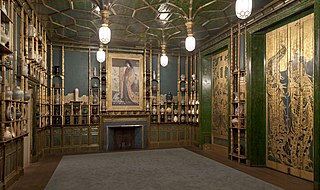
Aestheticism was an art movement in the late 19th century which valued the appearance of literature, music and the arts over their functions. According to Aestheticism, art should be produced to be beautiful, rather than to teach a lesson, create a parallel, or perform another didactic purpose, a sentiment best illustrated by the slogan "art for art's sake." Aestheticism originated in 1860s England with a radical group of artists and designers, including William Morris and Dante Gabriel Rossetti. It flourished in the 1870s and 1880s, gaining prominence and the support of notable writers such as Walter Pater and Oscar Wilde.

Sir Edward Coley Burne-Jones, 1st Baronet, was an English painter and designer associated with the Pre-Raphaelite Brotherhood which included Dante Gabriel Rossetti, John Millais, Ford Madox Brown and William Holman Hunt.

Richard Watson Dixon, English poet and divine, son of Dr James Dixon, a Wesleyan minister.
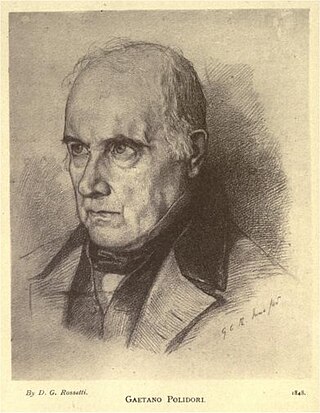
Gaetano Fedele Polidori was an Italian writer, political and scholar living in Highgate. He was the son of Agostino Ansano Polidori (1714–1778), a physician and poet who lived and practised in his native Bientina, near Pisa, Tuscany.

The Germ, thoughts towards nature in art and literature (1850) was a periodical established by the Pre-Raphaelite Brotherhood to disseminate their ideas. The magazine was edited by William Michael Rossetti. The Germ was renamed Art and Poetry, being Thoughts towards Nature, conducted principally by Artists for its last two issues. It was not a success, only surviving for four issues between January and April 1850.

Jane Morris was an English embroiderer in the Arts and Crafts movement and artists' model who embodied the Pre-Raphaelite ideal of beauty. She was a model and muse to her husband William Morris and to Dante Gabriel Rossetti. Her sister was embroiderer and teacher Elizabeth Burden.

Fanny Cornforth was an English artist's model, and the mistress and muse of the Pre-Raphaelite painter Dante Gabriel Rossetti. Cornforth performed the duties of housekeeper for Rossetti. In Rossetti's paintings, the figures modelled by Fanny Cornforth are generally rather voluptuous, differing from those of other models such as Alexa Wilding, Jane Morris and Elizabeth Siddal.
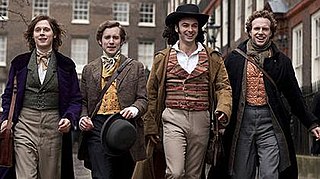
Desperate Romantics is a six-part television drama serial about the Pre-Raphaelite Brotherhood, first broadcast on BBC Two between 21 July and 25 August 2009.

The Oxford Union murals (1857–1859) are a series of mural decorations in the Oxford Union library building. The series was executed by a team of Pre-Raphaelite artists including Dante Gabriel Rossetti, William Morris and Edward Burne-Jones. The paintings depict scenes from Arthurian myth.
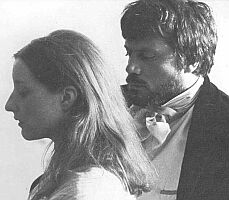
Dante's Inferno: The Private Life of Dante Gabriel Rossetti, Poet and Painter (1967) is a feature-length 35 mm film directed by Ken Russell and first screened on the BBC on 22 December 1967 as part of Omnibus. It quickly became a staple in cinemas in retrospectives of Russell's work. Using nonlinear narrative technique, it tells of the relationship between the 19th-century artist and poet Dante Gabriel Rossetti and his model, Elizabeth Siddal.
Sir Godfrey Lushington was a British civil servant. A promoter of prison reform, Lushington served as Permanent Under-Secretary of State at the Home Office of the United Kingdom from 1886 to 1895.
Vernon Lushington KC,, was a Positivist, Deputy Judge Advocate General, Second Secretary to the Admiralty, and was associated with the Pre-Raphaelites. He was a Cambridge Apostle.
Charles Joseph Faulkner (1833–1892) was a British mathematician and fellow of University College, Oxford and a founding partner of Morris, Marshall, Faulkner and Co. where he worked with his sisters Kate Faulkner and Lucy Faulkner Orrinsmith.
The Birmingham Set, sometimes called the Birmingham Colony, the Pembroke Set or later The Brotherhood, was a group of students at the University of Oxford in England in the 1850s, most of whom were from Birmingham or had studied at King Edward's School, Birmingham. Their importance as a group was largely within the visual arts, where they played a significant role in the birth of the Arts and Crafts Movement: The Set were intimately involved in the murals painted on the Oxford Union Society in 1857, and members William Morris, Edward Burne-Jones and Charles Faulkner were founding partners of Morris, Marshall, Faulkner & Co. in 1861.

Georgiana, Lady Burne-Jones was a painter and engraver, and the second oldest of the Macdonald sisters. She was married to the Late Pre-Raphaelite artist Edward Burne-Jones, and was also the mother of painter Philip Burne-Jones, aunt of novelist Rudyard Kipling and Prime Minister Stanley Baldwin, confidante and friend of George Eliot, William Morris, and John Ruskin. She was a Trustee of the South London Gallery and was elected to the parish Council of Rottingdean, near Brighton in Sussex.
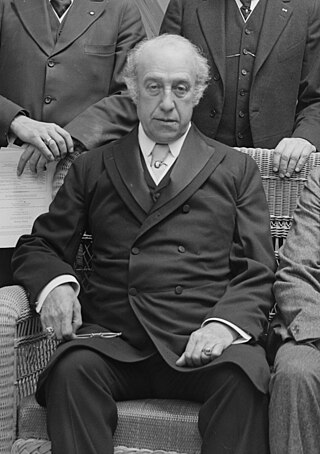
John Christian Freund was a British-American magazine publisher, playwright, and music critic. He founded several magazines, including The Music Trades.

Algernon Charles Swinburne was an English poet, playwright, novelist, and critic. He wrote several novels and collections of poetry such as Poems and Ballads, and contributed to the Eleventh Edition of the Encyclopædia Britannica.
